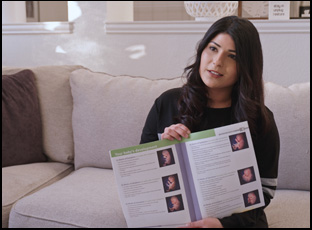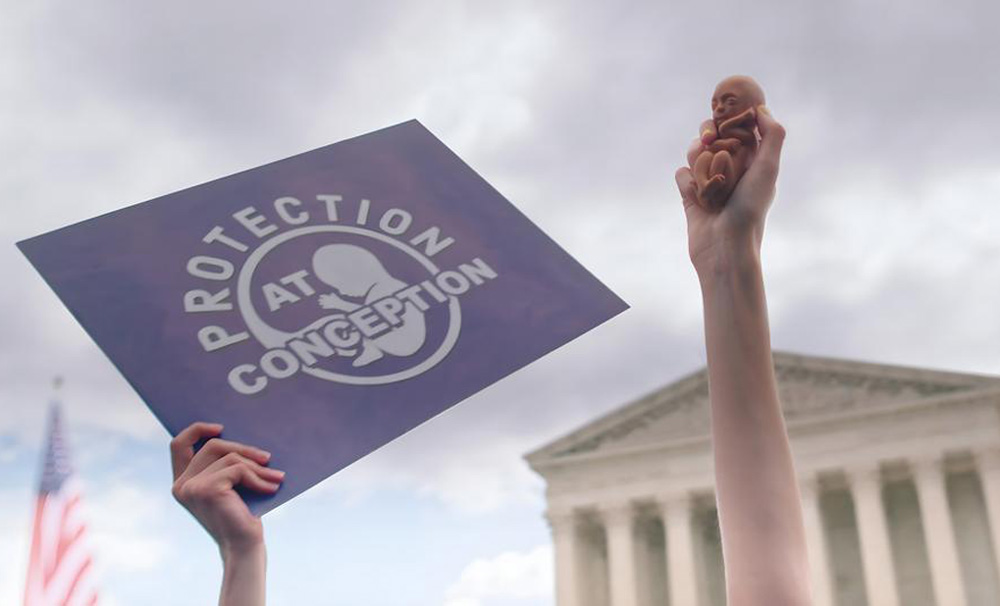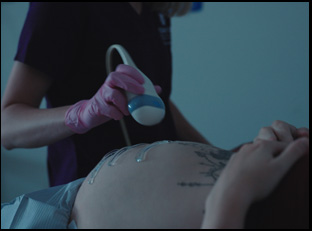Among the last things that should be on the mind of someone with an unwanted pregnancy is the uncertainty that they’ve gone to the wrong place in terms of medical care, a distinct possibility nowadays with the establishment of crisis pregnancy centers, places with no medical standing where the sole goal is to talk women into seeing through their pregnancy to term, no matter what risk it puts them at. Intending to confuse with similar names as abortion clinics and their use of language that is difficult to distinguish from arcane medical jargon, the CPCs have sprung up nearly at a rate as its competition has been shutting down, bullied out of town in red states and increasingly diminished in their capabilities by conservative court decisions including Dobbs v. Jackson Women’s Health Organization, which no longer made abortion a constitutional right.
When these two oppositional forces can often sit across the street from one another, Kate Dumke and Sabrine Keane are bound to open eyes by not only criss-crossing the country, but the equally arduous journey of simply walking down the block in “Preconceived,” which shows how massively organized the anti-choice movement has become. Starting out at the Idaho Pregnancy Resource Center, run by a group known as Stanton Healthcare, you might not think from the bland beige rooms filled with ultrasound machines that you’re not in a typical medical facility, but between the kindly attendants who may not necessarily know how to operate the equipment and to hear its founder Brandi Swindell tuck allusions to human rights abuses into language about a woman’s right to choose, it can set off alarms.
Showing how a difficult decision is made all that much harder when women can’t know what information to trust, Dumke and Keane’s own efforts to inform are exhaustive as they connect CPCs to larger religious organizations such as Heartbeat International and a growing movement amongst conservative legislators that legally require women to visit such places before coming to a decision about their pregnancy with EMMA (Every Mother Matters) laws. Their own journey through layers of organizations that aren’t shy about hiding their motives, but their connections proves labyrinthine, which is only fitting when they learn how needlessly complicated it can be to find the right assistance from following Maleeha and Maria, a pair of young women from Texas and Colorado respectively who found themselves at CPCs and take different paths.
“Preconceived” turned heads recently when it premiered at SXSW where it won a Best of Texas Award and in the midst of a busy festival en route to the Cleveland Film Fest where it will play this week, Dumke and Keane took the time to talk about how they became interested in gigantic yet little known cottage industry of CPCs, making an even-handed film on such a controversial issue and resisting the temptation to chase the news cycle to tell a deeper story.
Sabrine Keane: We first learned about CPCs in 2021 and we were really surprised that neither of us had heard about them before because they’re so widespread throughout the United States. The Supreme Court also agreed to hear Dobbs V. Jackson, so there was a shift in the reproductive landscape happening and we thought we really needed to dive deeper into CPCs and understand their role and and talk to both sides in order to understand what role they’d have in the future.
Kate Dumke: When we started, we didn’t imagine that Roe V. Wade would actually be overturned, so it was something that seemed distant at the time when we started and we were struggling to get access, but once Dobbs happened, access really opened up for us.
Sabrine Keane: Another thing I’ll say about Roe V. Wade is that we played around with different versions of this film and in an earlier version, we had so much footage of Roe V. Wade actively being overturned with the leak as it happened and what we realized is this film is really unique in focusing on CPCs, so we do include the context, but CPCs were relevant before Roe V. Wade was overturned and we wanted to communicate in our film.
Was there anything foundational as far as figuring out how you wanted to tell this story?
Kate Dumke: It was really important to us to tell the story from multiple perspectives, from the young women who had visited crisis pregnancy centers as well as from the people who are working on the ground in the centers, as well as people who are criticizing the centers for some of their practices that they believe could be harmful.
Sabrine Keane: We also found it really important to include Catholics for Choice because religion is a part of the story of CPCs, but we didn’t want to paint Christianity in a negative light. That’s really not the story we’re trying to tell, but instead one of transparency for the women that are visiting CPCs, [which are connected] often with pro-life religious ministries.
The revelation for me was to discover the large entities that these CPCs are connected to. Did you know how big an organization this was from the start?
Kate Dumke: It was a process of discovery for us, learning the interconnected nature of the centers under this bigger umbrella of network organizations who establish protocol for the centers. That was something that we learned throughout this process, but really wanted to highlight because there’s been a lot of coverage of crisis pregnancy centers in in media and other films, but they all go by different names, so there’s not this understanding that they’re they’re connected through these networks, so we really wanted to illuminate that. [Then] it was really tough to put together all of the different pieces because we wanted to look at it from different angles, but also have that intimate personal stories as a throughline.
Sabine Keane: It was hard to find women who were going to CPCs, but we found Maleeha through one of the organizations that’s interviewed in the field called the National Committee for Responsive Philanthropy and Maleeha’s story was included in a report they had done on CPCs, so they kindly put us in touch with her.
Kate Dumke: And we actually met Maria through Christine Yeargin, who’s one of the pro-life anti-abortion influencers. She was giving a photo shoot and baby shower to Maria after she had just given birth and then we wanted to really follow that story over time. Maria was such a great subject – she was really honest and candid and it was important to see her experience in real time.
Sabrine Keane: I also don’t want to spoil anything for people who haven’t seen it, but the film team created a GoFundMe for Maria because she still definitely is struggling with child care, if anyone’s interested in supporting her and her son.

Sabrine Keane: How we start the story was something that we talked a lot about in the edit room. Sasha Perry, our editor, was instrumental in crafting this story, but when most people haven’t heard about CPCs, trying to enter that world at the beginning is really difficult. We wanted in the opening sequence to be able to let you sit in the center for a moment and experience what that might be like and then go into explaining how [CPCs] go by different names and they have a controversial reputation. Some people call them fake clinics. Other people call them resource centers…
Kate Dumke: And it was also important to us to dig beyond this easy salaciousness of the controversial reputation [of the CPCs] and really try to understand it from different angles by including the voices of the people who worked there. They often don’t get included in those big headline stories.
Could it feel like whiplash, going from a CPC to an abortion clinic where as you allude to, the language is coded entirely differently?
Kate Dumke: It was very interesting, especially in Boise. Brandy talks about how Stanton Health Care is right across the street from Planned Parenthood, so we did get this experience of just crossing the street to talk to people on both sides of the aisle literally. We were very clear to people that we were we were talking to individuals on both sides of the abortion debate, and I do think that would raise red flags for people, but I was pleasantly surprised with how open-minded people were throughout.
Sabrine Keane: And Kate and I really dive deep into [different] views on CPCs and abortion in general and there was a lot of processing that we did. And the language piece is really interesting because Kate and I really tried to be respectful in our interviews and use the language that the people we were interviewing use and try to understand where they’re coming from. We got that feedback for during the interviews that that they were done with care and respect. At the end of the day, we were really hoping that regardless of politics that people could come to the agreement that pregnant people deserve access to transparent, accurate, and comprehensive health care information and to be able to access the resources they’re truly looking for. We’re not trying to change people’s views on abortion with this film.
Kate Dumke: One thing we were very aware of when thinking about our audience was we didn’t want to just be stuck in the perpetual echo chamber of only left-leaning people seeing the film or being able to understand what we were trying to put on the table, so we really did try to create a narrative that isn’t necessarily divisive around party lines. We wanted to create something that we hope people on both sides of the aisle could come see this underlying concept that people deserve clear, accurate information when making health care decisions.
“Preconceived” will next screen at the Cleveland Film Festival at the Mimi Ohio Theatre on April 5th at 4:55 pm and April 6th at 9:45 am. It will also be available to stream in the U.S. via the CIFF Streams platform from April 14th-21st.





